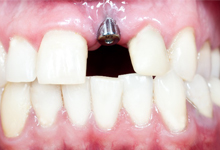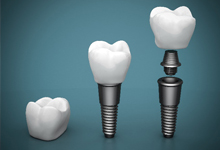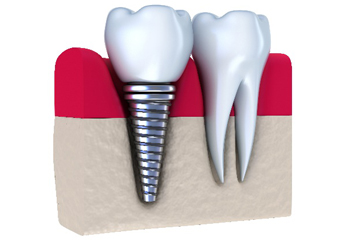Dental implants are fast becoming the most popular way to replace a missing tooth or teeth. They provide a solution that is currently the closest possible replacement to your natural teeth. Dental implants are a specialist treatment and so dentists are required to complete many hours of additional training before they are able to place them.
What is a dental implant?
A dental implant is a replacement for the root of your tooth or teeth. Dental implants are secured into the jawbone and will not be visible. The implant is then used as a base to support a crown, bridge or denture depending on the number of missing teeth. Along with replacing lost teeth, dental implants help maintain the jawbone’s shape and density. This means they also support the facial skeleton and, indirectly, the soft tissue structures — gum tissues, cheeks and lips. Dental implants help you eat, chew, smile, talk and look completely natural. Dental implants are made of titanium, which is lightweight, strong and biocompatible, which means that it is very unlikely to be rejected by the body. Dental implants have the highest success rate of any implanted surgical device but as with all implants there is no 100% guarantee of success.
Prior to treatment
Prior to any treatment the dentist will need to complete a full assessment of the level and health of bone present in your jaw. To do this they will need to take x-rays  of your jaw. If you do not have sufficient bone or the bone is not healthy enough it may be necessary to perform a bone graft prior to any treatment being completed. It will also be necessary to ensure that the socket has fully healed from the natural tooth extraction prior to starting implant placement. This means you will need to wait at least 3 months following tooth extractions before implant treatment can begin. The dentist will be able to create a temporary denture or bridge to hide the gap caused by the missing tooth or teeth while the socket heals.
of your jaw. If you do not have sufficient bone or the bone is not healthy enough it may be necessary to perform a bone graft prior to any treatment being completed. It will also be necessary to ensure that the socket has fully healed from the natural tooth extraction prior to starting implant placement. This means you will need to wait at least 3 months following tooth extractions before implant treatment can begin. The dentist will be able to create a temporary denture or bridge to hide the gap caused by the missing tooth or teeth while the socket heals.
Treatment
Dental implants are placed under a local anaesthetic so should be no different to having a filling. You may find that it is actually easier to place the dental implant than it was to remove the natural tooth in the first place. You may experience some discomfort in the week following surgery as the bone begins to fuse to the implant. This should be managed with over the counter pain killers. This will then be left for 3-5 months to form a secure foundation. 
Once the dental implant has fully healed an abutment is fitted over the top, which will support the crown, bridge or denture. Depending on the number of teeth to be replaced it may be necessary to have more than one implant to support a bridge or denture.
Prior to starting any treatment, the dentist will provide you with a full written treatment plan explaining exacting what treatment will be carried out and the estimated cost.
Aftercare
Dental implants should last for at least 10 years provided that they are properly cared for. Cleaning around the teeth attached to the dental implant should be no more difficult than cleaning your natural teeth.
cared for. Cleaning around the teeth attached to the dental implant should be no more difficult than cleaning your natural teeth.
If you are a smoker the dentist will advise that dental implants are not the best treatment for you as smoking can dramatically reduce the chance of dental implants being successful.
If you have any questions or would like more information on whether implants are right for you contact Ringmer Dental today on 01273 813898 and arrange a consultation.


